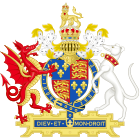
A ballad is a form of verse, often a narrative set to music. Ballads derive from the medieval French chanson balladée or ballade, which were originally "dance songs". Ballads were particularly characteristic of the popular poetry and song of Britain and Ireland from the Late Middle Ages until the 19th century. They were widely used across Europe, and later in Australia, North Africa, North America and South America.

Robin Hood is a legendary heroic outlaw originally depicted in English folklore and subsequently featured in literature, theatre, and cinema. According to legend, he was a highly skilled archer and swordsman. In some versions of the legend, he is depicted as being of noble birth, and in modern retellings he is sometimes depicted as having fought in the Crusades before returning to England to find his lands taken by the Sheriff. In the oldest known versions, he is instead a member of the yeoman class. Traditionally depicted dressed in Lincoln green, he is said to have stolen from the rich to give to the poor.

Sir Thomas de Ercildoun, better remembered as Thomas the Rhymer, also known as Thomas Learmont or True Thomas, was a Scottish laird and reputed prophet from Earlston in the Borders. Thomas' gift of prophecy is linked to his poetic ability.

The Laws in Wales Acts 1535 and 1542 or the Acts of Union, were Acts of the Parliament of England under King Henry VIII of England, causing Wales to be incorporated into the realm of the Kingdom of England.

The Act of Uniformity 1662 is an Act of the Parliament of England. It prescribed the form of public prayers, administration of sacraments, and other rites of the Established Church of England, according to the rites and ceremonies prescribed in the 1662 Book of Common Prayer. Adherence to this was required in order to hold any office in government or the church, although the new version of the Book of Common Prayer prescribed by the Act was so new that most people had never even seen a copy. The Act also required that the Book of Common Prayer 'be truly and exactly Translated into the British or Welsh Tongue'. It also explicitly required episcopal ordination for all ministers, i.e. deacons, priests and bishops, which had to be reintroduced since the Puritans had abolished many features of the Church during the Civil War. The act did not explicitly encompass the Isle of Man.

"Barbara Allen" is a traditional folk song that is popular throughout the English-speaking world and beyond. It tells of how the eponymous character denies a dying man's love, then dies of grief soon after his untimely death.

The folk music of England is a tradition-based music which has existed since the later medieval period. It is often contrasted with courtly, classical and later commercial music. Folk music traditionally was preserved and passed on orally within communities, but print and subsequently audio recordings have since become the primary means of transmission. The term is used to refer both to English traditional music and music composed or delivered in a traditional style.
The Books of Homilies are two books together containing thirty-three sermons developing the authorized reformed doctrines of the Church of England in depth and detail, as appointed for use in the 35th Article of the Thirty-Nine Articles of Religion. The longer title of the collection is Certain Sermons or Homilies Appointed to Be Read in Churches. They belong to the basic formularies of the Church of England.
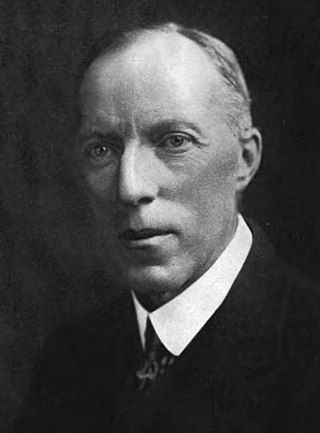
Cecil James Sharp was an English collector of folk songs, folk dances and instrumental music, as well as a lecturer, teacher, composer and musician. He was a key figure in the folk-song revival in England during the Edwardian period. According to Roud's Folk Song in England, Sharp was the country's "single most important figure in the study of folk song and music."

"The Ballad of Chevy Chase" is an English ballad, catalogued as Child Ballad 162. There are two extant ballads under this title, both of which narrate the same story. As ballads existed within oral tradition before being written down, other versions of this once-popular song also may have existed.

A chapbook is a small publication of up to about 40 pages, sometimes bound with a saddle stitch.
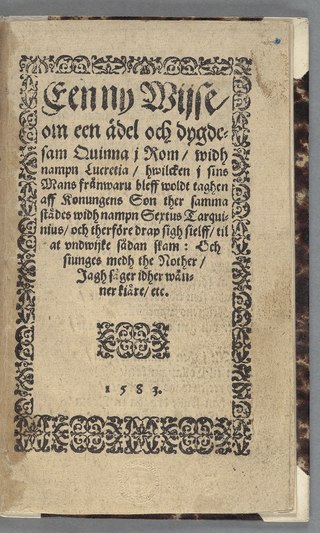
A broadside is a single sheet of inexpensive paper printed on one side, often with a ballad, rhyme, news and sometimes with woodcut illustrations. They were one of the most common forms of printed material between the sixteenth and nineteenth centuries, particularly in Britain, Ireland and North America because they are easy to produce and are often associated with one of the most important forms of traditional music from these countries, the ballad.
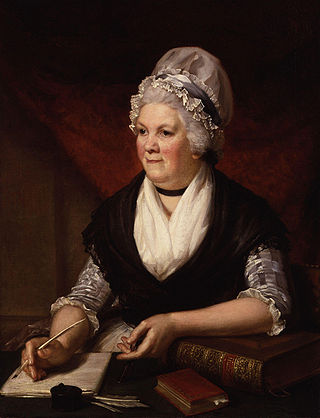
Sarah Trimmer was a writer and critic of 18th-century British children's literature, as well as an educational reformer. Her periodical, The Guardian of Education, helped to define the emerging genre by seriously reviewing children's literature for the first time; it also provided the first history of children's literature, establishing a canon of the early landmarks of the genre that scholars still use today. Trimmer's most popular children's book, Fabulous Histories, inspired numerous children's animal stories and remained in print for over a century.

The Society of Dependants were a Christian sect of Protestant dissenters founded by John Sirgood in the mid-nineteenth century. Their stronghold was in West Sussex and Surrey where they formed co-operatives in some villages. They were widely known as "Cokelers", a nickname of uncertain derivation but which was used from an early date.

The Tyndale Bible (TYN) generally refers to the body of biblical translations by William Tyndale into Early Modern English, made c. 1522–1535. Tyndale's Bible is credited with being the first Bible translation in the English language to work directly from Hebrew and Greek texts, although it relied heavily upon the Latin Vulgate. Furthermore, it was the first English biblical translation that was mass-produced as a result of new advances in the art of printing.

Lou Ann Barton is an American blues singer based in Austin, Texas since the 1970s. AllMusic noted that "The grace, poise, and confidence she projects on-stage is part of a long tradition for women blues singers".
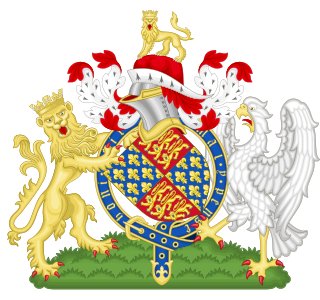
The Penal Laws against the Welsh were a set of laws, passed by the Parliament of England in 1401 and 1402 that discriminated against the Welsh people as a response to the Welsh Revolt of Owain Glyndŵr, which began in 1400.
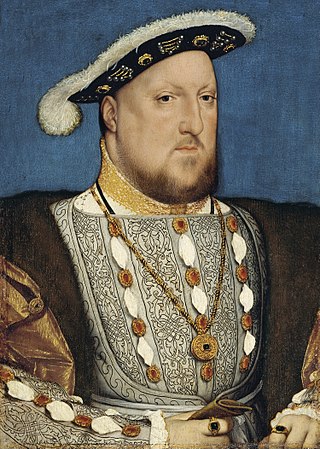
The English Reformation took place in 16th-century England when the Church of England broke away from the authority of the pope and the Catholic Church. These events were part of the wider European Reformation, a religious and political movement that affected the practice of Christianity in Western and Central Europe.

Music in early modern Scotland includes all forms of musical production in Scotland between the early sixteenth century and the mid-eighteenth century. In this period the court followed the European trend for instrumental accompaniment and playing. Scottish monarchs of the sixteenth century were patrons of religious and secular music, and some were accomplished musicians. In the sixteenth century the playing of a musical instrument and singing became an expected accomplishment of noble men and women. The departure of James VI to rule in London at the Union of Crowns in 1603, meant that the Chapel Royal, Stirling Castle largely fell into disrepair and the major source of patronage was removed from the country. Important composers of the early sixteenth century included Robert Carver and David Peebles. The Lutheranism of the early Reformation was sympathetic to the incorporation of Catholic musical traditions and vernacular songs into worship, exemplified by The Gude and Godlie Ballatis (1567). However, the Calvinism that came to dominate Scottish Protestantism led to the closure of song schools, disbanding of choirs, removal of organs and the destruction of music books and manuscripts. An emphasis was placed on the Psalms, resulting in the production of a series of Psalters and the creation of a tradition of unaccompanied singing.

Music in Medieval England, from the end of Roman rule in the fifth century until the Reformation in the sixteenth century, was a diverse and rich culture, including sacred and secular music and ranging from the popular to the elite.
